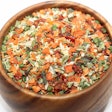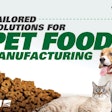
Research on L-carnitine, as the brand Carniking, demonstrated positive health effects of the amino acid on performance and recovery of working dogs. Pet food ingredient supplier Lonza sponsored the research, which was conducted at Four Rivers Kennel LLC, in Walker, Missouri, USA.
At the conclusion of the research, Labrador Retrievers that were supplemented with L-carnitine showed improved exercise performance, as well as higher lean mass, improved muscle recovery, and less oxidative stress during strenuous exercise.
Published in the Journal of Nutritional Science, “Utilization of dietary L-Carnitine for fuel efficiency, as an antioxidant, and for muscle recovery in Labrador Retrievers” details the beneficial effects of L-carnitine on lean mass and activity during exercise. Additionally, the research indicates the positive effect of L-carnitine in the prevention of muscle damage and the reduction of oxidative stress during strenuous exercise in working dogs.
“The positive results clearly demonstrated that Carniking L-carnitine helps recovery after exercise in active dogs and has significant effects on muscle mass,” said Dr. Craig Coon, CEO and co-owner for Four Rivers Kennel LLC, in a press release. “These effects provide the first evidence of Carniking L-carnitine’s specific positive impact on working dogs. This finding is promising as the increase in lean mass, recovery and activity can provide better quality of life and function for working animals and house pets, for example.”
L-carnitine supplement research design
A total of 96 Labrador Retrievers, analyzed within two experiments, were given 250 milligrams (mg) of L-carnitine once daily, for up to 14 weeks. L-carnitine with exercise showed significantly improved activity, body composition and recovery biomarkers. The dogs that were supplemented with L-carnitine were significantly more active than the control group during sprint (p=0.052) and endurance (p=0.0001) runs as measured via accelerometer collars.
Additionally, they gained 0.74 kg in total body weight upon conclusion of the study, while the control group lost 0.12 kg (p=0.0006). The increase in body weight was driven by an increase in lean mass. L-carnitine supplemented dogs gained 0.68 kg lean mass versus the control group, which lost 0.41 kg lean mass in average (p<0.0001) although they had a comparable caloric intake.
Additionally, the L-Carnitine group had a significantly lower creatine kinase level, a marker of muscle damage (p=0.003). Plasma myoglobin was also significantly lower in the L-carnitine group versus control, at both 1 hour after run (p=0.0157) and 24 hours post-run (p=0.0189). Oxidative stress was also improved, as evidenced by a significant decrease in thiobarbituric acid reactive substances (TBARS), and a significant increase in total antioxidant capacity (TAC) (p=0.0013 and p=0.0496, respectively).
“Carniking L-Carnitine at relatively low levels had a significant impact on muscle performance and recovery in working dogs, with similar effects in both genders. However, it is interesting to see that they are more pronounced in female dogs,” said Aouatef Bellamine, PhD, Senior Scientific Manager of Nutrition at Lonza, in a press release. “This data is promising for senior pets, in particular, where muscle performance continues to be an unmet need.”
Carniking L-carnitine is a special grade of L-carnitine manufactured by Lonza. It can be used in the manufacture of dog foods and treats (wet and dry) and can be added to complete feeds, base mixes or premixes due to its excellent flowability. It is also pellet and extruder stable.


















